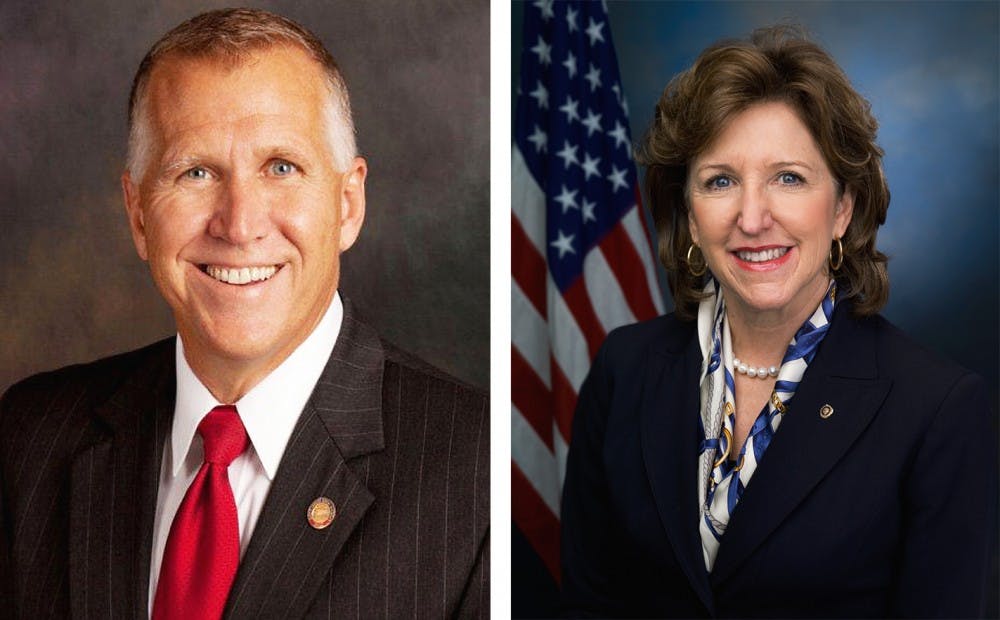Both sides have poured considerable funds into what is anticipated to be one of the most contentious—and costly—senate races of November. Buoyed by financial backing from conservative political advocacy groups, speaker of the North Carolina legislature Thom Tillis recently won a decisive victory in the Republican primary. Meanwhile, Hagan’s campaign has quietly continued to fundraise and build its infrastructure.
"She's saving her power,” said John Aldrich, Pfizer-Pratt University professor of political science. “A whole set of issues will come up in September and deciding what to use will take some time.”
How Hagan fares in November will remain largely tied to the amount of money her campaign raises, said Kerry Haynie, associate professor of political science and African and African American Studies.
“Follow the money,” Haynie said. “Watching how much money she raises between now and Labor Day is key.”
In terms of individual assets, Sen. Hagan reportedly has a fund of $8.6 million—more than eight times greater than Tillis’ $1 million in the bank.
Hagan will have a "harder road" to pursuing outside funding in later months, Haynie said—noting that Republicans traditionally have better access to wealthy contributors—and added that her fundraising will likely draw upon a large number of smaller donations.
Early in the race, both sides have already poured considerable funds into attack ads. Nearly $6.3 million in ads have aired in North Carolina—90 percent of which were funded by outside groups—according to a Wesleyan Media Project report.
Republicans have invested heavily in the North Carolina race, outspending Democrats in the state by more than $2 million. American Crossroads—a group backed by Republican political consultant Karl Rove—recently poured $3.6 million into Hagan attack ads, while Americans for Prosperity—funded by the Koch brothers— had reportedly spent over $7 million on ads against Hagan by April.
There is a potential downside to the funding, Haynie noted.
“Some of the groups [that funded the attack ads] are very conservative, but North Carolina tends not to be conservative as these groups,” Haynie said. “It could cost [Tillis] some support."
A majority of the ads target Hagan’s record of legislative support for the Affordable Care Act. The ads set the stage for how Hagan will fare in later months, Aldrich said.
“It’s one of those things you set up early, to set a negative tone for Hagan,” Aldrich said. “Everybody knows about [the health care] issue. When you really start to talk about stuff—whether it’s opposition to the keystone pipeline or unemployment—you still have the background.”
Chris Hayden, press secretary for the Hagan campaign, said that Sen. Hagan favors a revision of the health care act but deferred questions on specific policy changes to the legislative office.
“My suspicion is that she’s building a proposal to last through the election,” Aldrich said. “When she’ll be re-elected, it remains to be seen whether she’ll do anything. You can make proposals relatively easily, but getting them to pass is another story entirely.”
The Hagan campaign may have yet to decide on an official position with regards to the health care act, Haynie said.
“I don’t think she will embrace it, but I don’t think she’ll run away from it,” he said. “I’m not sure they know. What I suspect they’ll do is do a bunch of polling and see what the public is thinking.”
The Hagan campaign has countered attacks on Hagan by pointing to Tillis’ legislative record supporting spending cuts on education and tax-breaks. In recent weeks, Tillis has drawn criticism for his proposition to “divide and conquer” welfare recipients—perceived by many to resemble Mitt Romney’s 47 percent statement.
“The bottom line is between Kay’s record of putting the people first, and Thom’s record of putting special interest firsts,” Hayden said.
Hagan is currently conserving her resources, Haynie said, and noted that the incumbent senator will likely mount a stronger campaign now that an official Republican challenger has been chosen.
For the time being, the Democrats’ best strategy is to build their organizational base and to avoid voter fallout, Aldrich said. Hagan will likely turn out to be a more accomplished campaigner than anticipated, he added.
Get The Chronicle straight to your inbox
Signup for our weekly newsletter. Cancel at any time.

